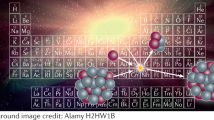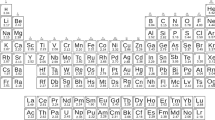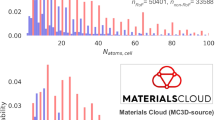Abstract
ONE of the most remarkable characteristics of atoms is their predilection for the number 2 or for even numbers. The nuclei of atoms are now considered to be built up from hydrogen nuclei, which may be called positive electrons or protons. Suppose these to be P in number. Combined with these are N negative electrons. Since these N negative electrons may for most purposes be considered to neutralise the charge of N protons, the net positive charge on the nucleus is equal to P–N or M, the Moseley or atomic number. Now it is most remarkable that in about 97–98 per cent, of all atoms N is even; in 90–95 per cent. P is even; and M or P–N is also even in 89 per cent, of the atoms in the surface of the earth and in 98 per cent, of the atoms in thie meteorities.
This is a preview of subscription content, access via your institution
Access options
Subscribe to this journal
Receive 51 print issues and online access
$199.00 per year
only $3.90 per issue
Buy this article
- Purchase on Springer Link
- Instant access to full article PDF
Prices may be subject to local taxes which are calculated during checkout
Similar content being viewed by others
Author information
Authors and Affiliations
Rights and permissions
About this article
Cite this article
HARKINS, W. Isotopes: Their Number and Classification. Nature 107, 202–203 (1921). https://doi.org/10.1038/107202a0
Issue Date:
DOI: https://doi.org/10.1038/107202a0
Comments
By submitting a comment you agree to abide by our Terms and Community Guidelines. If you find something abusive or that does not comply with our terms or guidelines please flag it as inappropriate.



